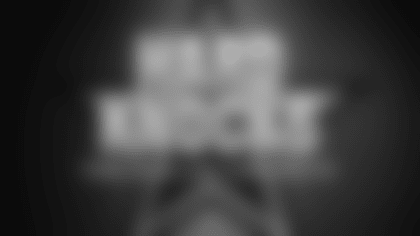FRISCO, Texas – The future might look a bit different from here on out.
The NFL's owners approved a proposed rule change, submitted by the Kansas City Chiefs, on Wednesday afternoon, relaxing the guidelines for league jersey numbers for specific positions.
The expanded rule will allow running backs, tight ends, fullbacks and wide receivers to wear any number between 1-49, as well as 80-89. Defensive backs will also be eligible to wear 1-49, while linebackers are now eligible to wear 1-59 in addition to 90-99. Things stay mostly the same for offensive linemen, who can wear 50-79, and defensive linemen, who can wear 50-79 and 90-99. Quarterbacks and specialists also remain at 1-19.
This could obviously have big ramifications for the Cowboys. Since the proposal was first suggested, several Cowboy players have mentioned their desire to switch into a new number under a new rule system. Jaylon Smith famously wore No. 9 during his college career at Notre Dame, and expressed his desire to switch back if rules allowed for it. The same was said by Ezekiel Elliott, who wore No. 15 during his time at Ohio State.
It's not that simple, though. NFL rules stipulate that, if a player wants to change his number for the upcoming season, he'd be responsible for buying out the existing inventory of his existing jersey in stores. Obviously, that could get quite expensive for a popular player like Smith or Elliott.
If a player wants to give notice now for a number change in 2022, though, there would be no charge.
It will be interesting to see who, if anyone, on the Cowboys' roster takes advantage of the new rule.
In the meantime, several other rule changes were agreed to on Wednesday:
- Expanded booth-to-official communication during reviews, aimed at helping officials identify things that can be clearly seen on the TV broadcast, but not from the field.
- An onside kick proposal that will limit the receiving team to nine men in the "set up zone." The idea is that, with fewer men allowed near the ball, the kicking team will have a better chance at recovering, making the play more entertaining.
- The elimination of preseason overtime, ensuring that teams don't have to risk injury playing an extra period during an exhibition game.
- A rule change that will ensure the enforcement of all accepted penalties committed by either team during successive extra point try attempts.
- The approval of a proposal that adds a loss of down to a penalty for a second forward pass from behind the line of scrimmage, as well as for plays where the ball is thrown after it returns behind the line.















